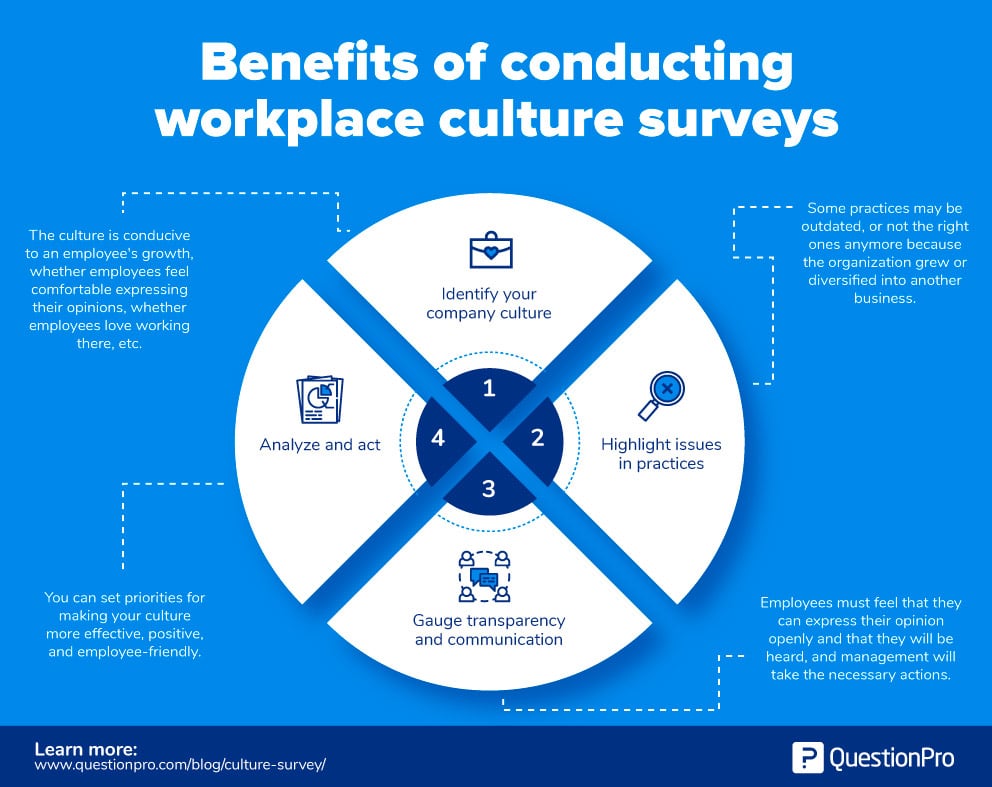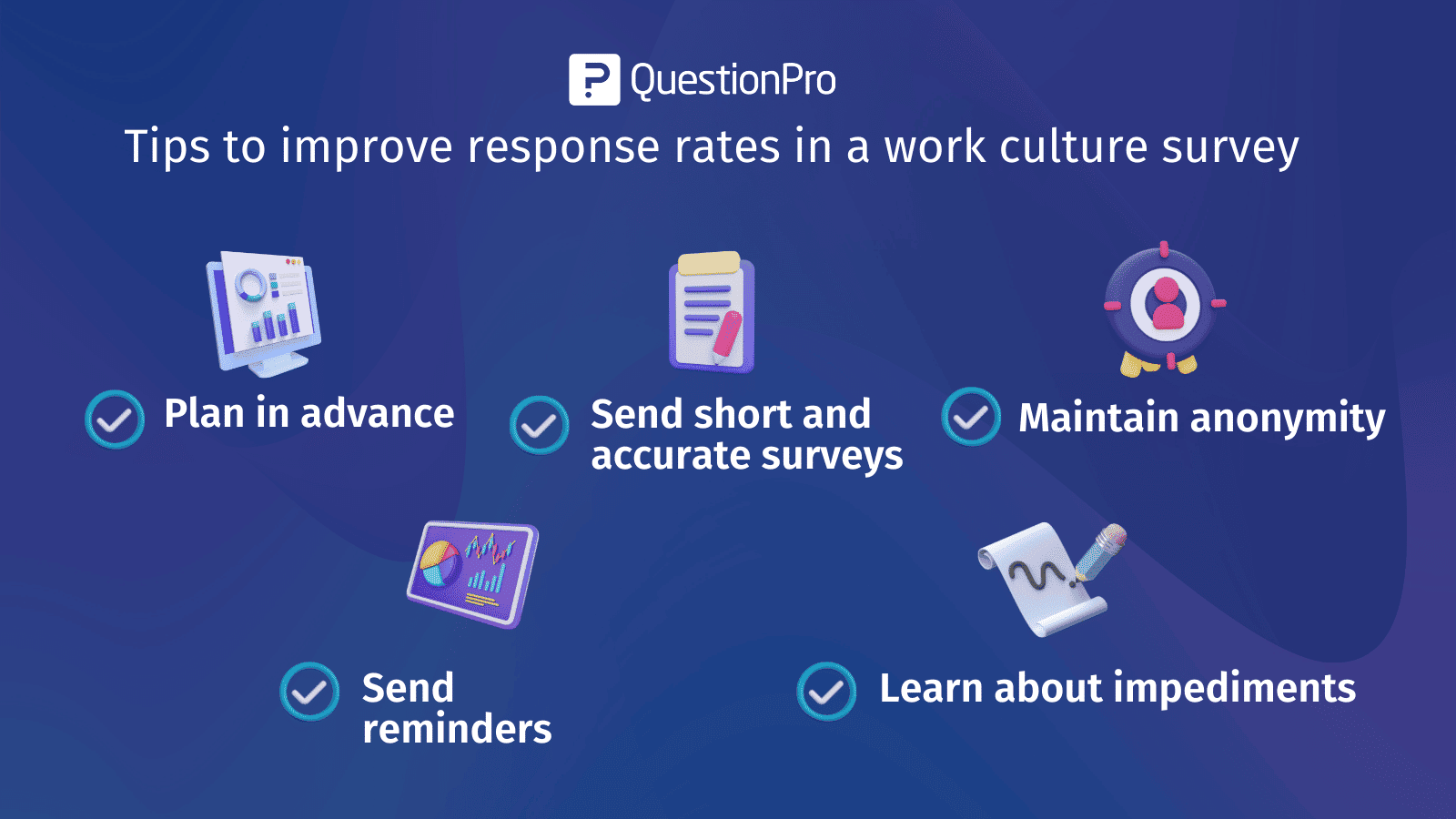Culture Survey: Top 20 questions to ask at work & tips

An organization that’s aware of the importance of workplace culture and makes improvements each year will perform better than an organization that ignores or takes very little interest in it. Conducting a work culture survey helps diagnose a bridge, if it exists, between the current company culture and the culture an organization’s management hopes to achieve.
By analyzing employee feedback and perceptions about the company culture at present and aspects of the culture they find appealing, an organization can mend its employee strategies to try and eliminate the gap between the two.
Let’s dive more deeply into the topic of culture survey and its importance in this post, as well as the top 20 employee survey questions and tips that promote development, innovation, and success.
Content Index hide
What is a work culture survey?
A work culture survey is a tool to collect insights from employees associated with the organization to assess and improve the business and enhance leadership strategies, future investments, and overall organizational changes. It is an hr survey that evaluates how well-aligned is an organization’s culture with its propagated values and ethics.
“Customers will never love a company until the employees love it first.” – Simon Sinek, Author, Start with Why
An organization should understand what employees think about their culture and what can be improved to make it a better workplace. Every cultural aspect of a workplace directly or indirectly impacts business.
Organizations that intend to create a workplace primarily driven by specific behaviors and focus on developing a conducive culture often rely on culture surveys. Gaining insights into current company culture and analyzing its alignment with the ideal set workplace culture will benefit the organization in terms of better planning, increased performance standards, employee engagement, etc.
Forbes magazine emphasizes how crucial it is to ensure the organization maintains a healthy company culture and improves its status quo.
Internal hierarchy, technologies, skills, and qualities influence actions and assumptions, and the entire system is measured with company culture surveys.
With the inputs provided by each employee, an organization can work towards improving its vision for culture, job roles, job satisfaction, and structure, manage the performance of company-wide teams, and enhance managerial techniques.
Benefits of conducting workplace culture survey
Now that we know what questions you need to cover in your online company culture surveys let’s look at why we should conduct them. Here are some key benefits of driving a workplace culture survey.
LEARN ABOUT: Work culture

Identify your company culture
Highlight issues in practices
Gauge transparency and communication
Analyze and act in culture survey
Top 20 company culture survey questions you can’t afford to miss!
If you are running a culture survey in your organization, include these employee survey questions in your questionnaire.
On a scale of 0-10, how likely are you to recommend our organization to your friends and colleagues due to the culture?
Satisfied employees will often boast about their company culture amongst their friends and colleagues, and so will dissatisfied employees. But satisfied employees will recommend their network to apply for jobs with your organization which will is profitable for your organization. In contrast, dissatisfied employees will spread negative word about your culture.
- An individual grows tremendously in situations where he/she feels respected. This survey question is instrumental in understanding whether the employee’s team respects him/her and how the factor of respect contributes to their productivity.
- Feedback is key for an employee’s progress in an organization. Does an employee’s manager provide frequent improvement tips and feedback? Ask this question to understand and analyze how to make employee feedback a constant process.
- Every employee has an opinion about how their culture can improve, and most of them also know details about competitors’ company culture. Include this question to enhance your current workplace culture and improve employee satisfaction.
- Employees in an organization look up to the 360 leadership assessment of the organization. A leader with integrity, discipline, hard-working, intelligence, and similar traits are respected within the organization, and employees want to replicate these traits. So, it is important to ask this question to understand how employees perceive the leadership in the organization.
- An organization’s management style speaks volumes about how things are conducted within the organization. Good management means good values, which in turn, results in lower employee attrition rates.
- Success is defined differently in every organization. Organizations should clearly emphasize the measures of success to their employees.
- An organization that doesn’t discriminate based on gender questions, sex, religious questions, color, or sexual orientation is a safe place for employees to be in. This is an important question to ask in your survey to determine if your employees want to work for your company.
- An organization that helps employees perform better will always experience better employee satisfaction and employee engagement levels. And a workforce that knows how they impact the organization will always be willing to go above and beyond to do good for the organization.
- An organization that is ethical by all means is the first choice for employees. It is important to know if your employees feel the same or not about the organization they work in. If they have a different opinion, it’s time to evaluate yourself as an organization.
- Suppose employees are unhappy working and doing things the way an organization wants them to. In that case, there is undoubtedly a conflict of interest, and an organization must take the initiative to resolve this. So if your employees feel that their organization is negatively impacting them, evaluate immediately!
- Job security is important for employees within the organization. This must be addressed if employees fear losing their jobs because of petty issues. This attribute indeed leads to negative work culture.
- Employee safety should be on top of the agenda for organizations. If female employees work until late at night, proper arrangements should be made for their safety and protection. At all times, employees should feel safe in the workplace.
- Another important question that should be a part of a company culture survey; employees need to know there is a zero-tolerance policy against discrimination.
- It is important employees feel valued at their workplace. If a good manager or supervisor guides an employee in decision-making or gives them responsibility, it shows the greater character of the leadership within the organization.
- Employees want to feel heard. Organizations need to implement steps to ensure their employees feel involved and respected, especially while making changes to policies that directly affect them.
- Teamwork and cooperation are the two attributes that determine an organization’s culture to a larger extent. Positive work culture will exhibit both these attributes strongly. Ask your employees what their say is.
- Satisfied employees excel in the workplace because they are challenged and given helpful feedback. The performance review is an important process that every organization follows. But knowing whether your employees think it is fair is also important.
- Always include this question towards the end. Employees have some good insights that can be a part of your survey. As you progress, you can make amendments to the existing organization’s culture survey questions- add/delete and collect meaningful feedback.
Tips to improve survey response rates
Response rates to surveys can have a big effect on how valid and useful your research results are. A low response rate could lead to a biased sample and results that can’t be trusted.
LEARN ABOUT: Employee Trust
To get a good number of responses, you need to do things to encourage people to fill out your survey. In this way, you can use a few tips to increase the number of people who respond to your surveys.

Plan well in advance for your work culture survey
It is essential to understand that to improve response rates for a culture survey. An organization should create a plan before sending the survey. The management, the partners, and everyone involved should contribute to creating excitement around work culture surveys.
Send a short and accurate survey
Maintain anonymity
Send reminders
Learn about impediments
Work culture survey vs. employee engagement survey
Many organizations and HR managers wonder if they should run culture or engagement surveys in their organizations. Or should we run both? What is the difference? Let us quickly look at key aspects that differentiate culture questionnaires and engagement questionnaires.
Scope
The scope of the study is what differentiates organizational culture surveys and employee engagement surveys. An employee engagement survey will focus on their perception of the organization and their feelings about their job.
Perspective
Measurement
Employee survey questions gauge the factors impacting employee performance. It looks at how they feel about their work, job responsibilities, peer relations, team relations, well-being, work-life balance, collaboration, cooperation, and others.
Conclusion
Asking thoughtful company culture survey questions and taking action on survey results is important if you want to improve company culture. You can keep track of gaps across the components of your workplace culture by continuously soliciting and assessing employee insights. You can use employee opinion survey questions. Those questions provide valuable insights into employee morale, enabling organizations to make informed improvements and foster an engaged workforce.
The most important thing is to appreciate the input and let the employees know what the leadership is doing to make adjustments.
Ready to create a company culture where everyone can reach their full potential? Learn more about how to get ongoing feedback from your employees and start taking action to make a positive impact in your organization with QuestionPro Workforce.




